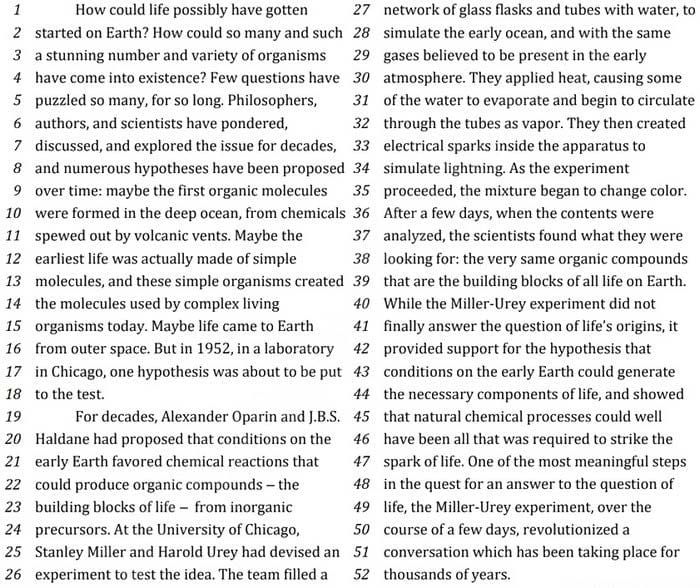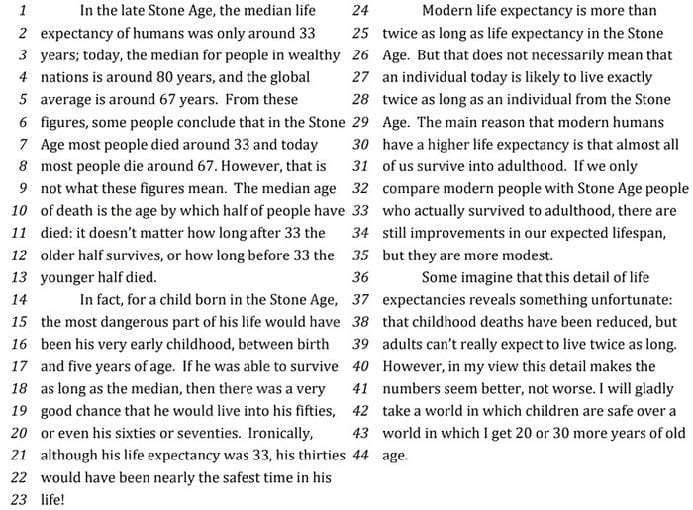Exam Details
Exam Code
:ISEE-TESTExam Name
:Independent School Entrance ExaminationCertification
:Test Prep CertificationsVendor
:Test PrepTotal Questions
:450 Q&AsLast Updated
:Apr 13, 2025
Test Prep Test Prep Certifications ISEE-TEST Questions & Answers
-
Question 321:
The passage suggests that: A. Oparin and Haldane's theory is the only explanation left for how life could have begun.

B. although it was interesting, the Miller-Urey experiment was ultimately a failure.
C. there's no evidence one way or another for how life really began.
D. we may need to learn more before we can finally determine how life began.
-
Question 322:
Based on information in the passage, we can conclude that a Stone Age man in his thirties would most likely:

A. continue to live for many more years.
B. die before reaching adulthood.
C. live twice as long as a person born in modern times.
D. live only for one or two more years.
-
Question 323:
Information from the passage supports which of the following statements?

A. It is now possible to accurately predict how long an individual will live.
B. The global average lifespan will probably double again in coming years.
C. Only a very small percentage of people from the Stone Age are still alive.
D. Modern life expectancy is shorter in countries that are not very wealthy.
-
Question 324:
This passage is primarily concerned with:

A. criticizing people who want to live into their hundreds.
B. persuading people that the way humans lived in the Stone Age was healthier than the way they live now.
C. describing two different methods of averaging numbers.
D. explaining why median life expectancy is so much higher today than in the past.
-
Question 325:
Based on information in the passage, we can conclude that people who reach adulthood today:

A. will probably live somewhat longer than people who reached adulthood in the Stone Age.
B. shouldn't expect to live quite as long as people did in the past.
C. will not live as long on average as their parents.
D. will live twice as long as people who reached adulthood in the Stone Age.
-
Question 326:
According to the passage, the median life expectancy is: A. the age that half of all people will live to, or will live beyond.

B. the maximum age to which a person can expect to live.
C. about how long a child can expect to survive.
D. the age at which people are most likely to die.
-
Question 327:
With which of the following statements would the author most likely agree?

A. It would have been much more exciting to live in the Stone Age than today.
B. We're all much better off in the modern world, where children can safely grow up.
C. Adults today are not really any better off than they were in the Stone Age.
D. The world would be a better place if fewer people lived into their hundreds.
-
Question 328:
In the passage below, businessman and philanthropist Andrew Carnegie describes an interaction with business partners, which would influence their future relationship.

Why did Mr. Morgan give Mr. Carnegie an extra check for ten thousand dollars?
A. Mr. Carnegie had clearly forgotten what his property was worth, and Mr. Morgan didn't want to take advantage of his mistake.
B. Mr. Morgan though that Mr. Carnegie could get a much better price if he bargained, so he overpaid to avoid haggling.
C. Mr. Pierpont Morgan had accidentally given bad information to his father about how much Mr. Carnegie was asking for, but by the time the mistake was discovered it was too late to correct it.
D. Mr. Morgan knew that if he overpaid on their first deal, it would impress Mr. Carnegie and he would be sure to get better deals in the future.
-
Question 329:
In the passage below, businessman and philanthropist Andrew Carnegie describes an interaction with business partners, which would influence their future relationship.

The main purpose of the passage is to:
A. describe the business of investing to the uninitiated.
B. relate a story about the integrity of a business partner.
C. tell a story about a bad investment decision.
D. show how the narrator became a successful businessman.
-
Question 330:
In the passage below, businessman and philanthropist Andrew Carnegie describes an interaction with business partners, which would influence their future relationship.

Which best explains why Mr. Carnegie said to Mr. Pierpont Morgan "In these days I will sell anything for money" (lines 8-9)?
A. Mr. Morgan had always dealt honorably with Mr. Carnegie in the past, so he knew that he would get a good deal.
B. Mr. Carnegie was eager to make whatever money he could during the financial panic.
C. Mr. Carnegie was very new to business at that time, and eager to make any deal that he could.
D. Mr. Pierpont Morgan was Mr. Carnegie's main source of revenue, so he wanted to keep him happy.
Related Exams:
AACD
American Academy of Cosmetic DentistryACLS
Advanced Cardiac Life SupportASSET
ASSET Short Placement Tests Developed by ACTASSET-TEST
ASSET Short Placement Tests Developed by ACTBUSINESS-ENVIRONMENT-AND-CONCEPTS
Certified Public Accountant (Business Environment amd Concepts)CBEST-SECTION-1
California Basic Educational Skills Test - MathCBEST-SECTION-2
California Basic Educational Skills Test - ReadingCCE-CCC
Certified Cost Consultant / Cost Engineer (AACE International)CGFM
Certified Government Financial ManagerCGFNS
Commission on Graduates of Foreign Nursing Schools
Tips on How to Prepare for the Exams
Nowadays, the certification exams become more and more important and required by more and more enterprises when applying for a job. But how to prepare for the exam effectively? How to prepare for the exam in a short time with less efforts? How to get a ideal result and how to find the most reliable resources? Here on Vcedump.com, you will find all the answers. Vcedump.com provide not only Test Prep exam questions, answers and explanations but also complete assistance on your exam preparation and certification application. If you are confused on your ISEE-TEST exam preparations and Test Prep certification application, do not hesitate to visit our Vcedump.com to find your solutions here.